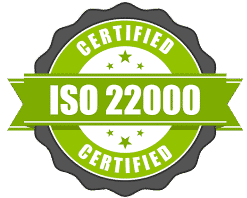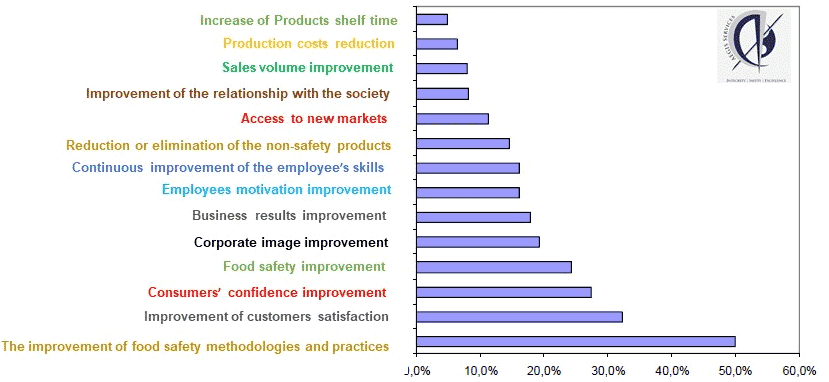Ensuring Food Safety Across a Complex Global Supply Chain
In today’s global market, food safety has become a critical concern as food products move across borders and through complex supply chains. ISO 22000:2018 is an internationally recognized standard that provides a structured approach for organizations to manage food safety risks and ensure that products are safe for consumption. This standard applies to all organizations in the food chain, enabling them to implement a Food Safety Management System (FSMS) that addresses consumer health concerns, regulatory requirements, and safety standards.

The Objectives of ISO 22000
ISO 22000 has several key objectives that benefit both consumers and businesses:
- To enhance food safety
- To ensure consumer protection
- To strengthen consumer confidence
- To improve cost-efficiency across the food supply chain
- To comply with Codex HACCP principles
- To harmonize international standards for food safety
- To provide a platform for international communication of HACCP principles
- To align with ISO 9001 and ISO 14001 standards for seamless integration of quality and environmental management systems
ISO 22000 Certification: Industries Served
ISO 22000 is designed for a wide range of organizations involved in the food industry, from direct food producers to supporting service providers. AEGIS offers ISO 22000 certification services across the following industries:
- Farms, Fisheries, and Dairies
- Food Processors (e.g., meats, fish, snacks, beverages, canned goods)
- Food Service Providers (e.g., restaurants, hospitals, hotels)
- Food Storage, Transportation, and Distribution
- Food Packaging Materials and Equipment Suppliers
- Providers of Food Cleaning Agents, Additives, and Ingredients
This broad applicability allows any organization connected to the food chain to implement ISO 22000 and ensure the highest standards of food safety.
Implementation of ISO 22000
ISO 22000 combines widely accepted food safety practices and principles across the food chain. The core elements of ISO 22000 include:
- Interactive Communication
Effective communication is essential for managing food safety across the supply chain. ISO 22000 encourages proactive communication within the organization and with external partners, including suppliers, distributors, and regulatory bodies. - HACCP Principles and System Management
ISO 22000 integrates HACCP (Hazard Analysis and Critical Control Points) principles, ensuring that preventive measures are applied consistently throughout food production. This approach includes hazard analysis, identifying critical control points, and implementing appropriate preventive actions. - System Management and Prerequisite Programs (PRPs)
ISO 22000 incorporates prerequisite programs (PRPs) and operational PRPs (oPRPs) to maintain hygiene, manage hazards, and provide a safe environment for food production. PRPs include infrastructure requirements, equipment maintenance, cleaning protocols, and pest control.
Preventive Approach with PDSA Philosophy
ISO 22000 emphasizes a preventive approach, integrating HACCP with the Plan-Do-Study-Act (PDSA) cycle. This approach enables organizations to address potential hazards systematically and implement continuous improvements to their food safety systems.
HACCP and ISO 22000 Link
ISO 22000 integrates the principles of the Hazard Analysis and Critical Control Point (HACCP) system with Prerequisite Programs (PRPs) through auditable requirements. These programs include all essential amenities and practices required to maintain a hygienic environment, ensuring safe production, management, and supply of final food products throughout the entire food chain. This integration provides a structured, preventive approach to managing food safety hazards, supporting compliance with international standards.
Differences Between HACCP and ISO 22000
While HACCP is a food safety system, ISO 22000 is a comprehensive food safety management system standard that expands on HACCP principles. Key differences include:
- ISO 22000 allows external experts to develop and verify an FSMS for an organization.
- ISO 22000 mandates a risk analysis to assess every identified food safety hazard.
- Documentation of PRPs: ISO 22000 requires the organization to document its PRPs, providing a structured approach to food safety management.
- HACCP separates control measures into preconditions and critical control points (CCPs), while ISO 22000 adds operational PRPs (oPRPs) for a more comprehensive safety approach.
This combination of HACCP and ISO 22000 enhances food safety through preventive, systematic measures that are applicable across the food chain.
HACCP Principles in ISO 22000
HACCP Principles
The ISO 22000 Food Safety Management System incorporates the seven key principles of the Hazard Analysis and Critical Control Point (HACCP) plan. These principles form the foundation of ISO 22000’s preventive approach to food safety:
- Conduct a hazard analysis to identify potential food safety hazards.
- Determine the critical control points (CCPs) in the process where hazards can be prevented, eliminated, or reduced.
- Establish essential limits for each CCP to ensure safety.
- Set up monitoring procedures to consistently check control points.
- Establish verification procedures to confirm that the system is working effectively.
- Implement record-keeping and documentation procedures to track processes and verify compliance.
By incorporating these HACCP principles, ISO 22000 ensures a systematic approach to managing food safety risks across the food chain.
Benefits of ISO 22000 Certification
ISO 22000 certification provides numerous benefits, enhancing both business performance and food safety. These include:
- Global recognition and an auditable standard that meets international food safety requirements
- Reduced customer complaints and enhanced food protection methodologies
- Improved staff morale, motivation, and performance through a clean, safe working environment
- Due diligence evidence that reduces the likelihood of product recalls and adverse publicity
- Enhanced customer satisfaction and consumer confidence
- Improved regulatory compliance and audit readiness
- Improved communication within the business and with external agencies, suppliers, and customers
- Compatibility with ISO 9001 for quality management and ISO 14001 for environmental management
- A structured framework that aligns PRPs, HACCP, and ISO 22000 requirements to promote effective food safety management

ISO 22000 Certification Process with AEGIS
AEGIS provides comprehensive support for ISO 22000 certification, ensuring a seamless and effective implementation process. Our services include:
- Awareness Training
Training sessions to educate your team on ISO 22000 requirements and standards. - Food Safety Policy and Objectives Workshop
Assistance with developing food safety policies and setting clear objectives. - Gap Analysis
A detailed assessment to identify gaps between current practices and ISO 22000 requirements. - Documentation Design
Development of necessary documentation, including manuals, procedures, work instructions, and formats. - Implementation Assistance and Training
Guidance and support for effective implementation of ISO 22000 across all relevant departments. - Internal Auditor Training and Lead Auditor Training
Training for your team to conduct internal audits and manage the certification process. - Pre-Assessment Audit
A preliminary audit to ensure readiness for the final certification audit.
Our process ensures 100% success in ISO 22000 certification and helps organizations integrate food safety practices that add long-term value.
Post-Certification Support
AEGIS offers ongoing post-certification support to help organizations maintain ISO 22000 standards, monitor compliance, and make continuous improvements. This service ensures that food safety management remains a core part of your operations, enhancing customer trust and operational efficiency.
Why Choose AEGIS for ISO 22000 Certification?
AEGIS is a recognized ISO 22000 consultant in Qatar, known for practical and effective food safety management solutions. Here’s why organizations choose AEGIS:
- Tailored Documentation Services: Preparation of ISO 22000 documents customized to your business needs, ensuring full compliance with the standard.
- Comprehensive Training Programs: From awareness training to internal audit preparation, our consultants provide in-depth training at every stage of certification.
- Cost-Effective and Efficient: We deliver practical solutions that simplify the certification process, helping you achieve compliance quickly and affordably.
- Long-Term Value and Support: AEGIS provides post-certification consultation, ensuring that your FSMS continues
Any questions?
© COPYRIGHT 2024 AEGIS SERVICES L.L.C.
COMPANY
CONNECT WITH US
- Address: Office no. 10, Level 15, Commercial Bank Plaza, Majlis Al Taawon St, West Bay, 27111, Doha, Qatar
VERIFY CERTIFICATE

- Address: Office no. 10, Level 15, Commercial Bank Plaza, Majlis Al Taawon St, West Bay, 27111, Doha, Qatar
- Tel: +974-4466-2120
- Fax: +974-4452-8030
- Email: [email protected]
VERIFY CERTIFICATE
- 8:30 AM - 7:00 PM SATURDAY TO THURSDAY
- Office no. 10, Level 15, Commercial Bank Plaza, Majlis Al Taawon St, West Bay, 27111, Doha, Qatar


